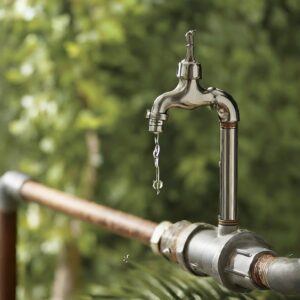
Water Conservation in Residential Properties
By Manhattan Adviser Group
Water conservation is an essential practice aimed at reducing water use, minimizing waste, and promoting the sustainable management of this vital resource. In residential properties, water conservation not only helps preserve local water supplies but also reduces utility bills and environmental impact.
This report explores various methods, benefits, and strategies for water conservation in residential settings.
Water conservation involves the careful management of water resources to ensure their availability for current and future generations. It encompasses practices that reduce water consumption, improve efficiency, and minimize waste.
Water is a finite resource with growing demand due to population growth, urbanization, and climate change. Conserving water helps mitigate the impact of droughts, reduces the energy required for water treatment and distribution, and preserves ecosystems.
Residential properties account for a significant portion of total water use.
Understanding the distribution of water use within homes is crucial for identifying conservation opportunities.
Key areas of residential water use include:
Indoor Use:
- Showers and baths
- Toilets
- Faucets
- Laundry
- Dishwashing
Outdoor Use:
- Landscaping and gardening
- Pools and spas
- Car washing
- Outdoor cleaning
Effective Water Conservation Strategies
Indoor Water Conservation
- Efficient Fixtures and Appliances
- Low-flow showerheads and faucets: Reduce water use without compromising performance.
- Dual-flush and low-flow toilets: Use less water per flush.
- Water-efficient appliances: ENERGY STAR-rated washing machines and dishwashers.
- Behavioral Changes
- Shorter showers: Reducing shower time can save significant amounts of water.
- Turn off the tap: When brushing teeth or shaving, turn off the tap to save water.
- Full loads: Only run dishwashers and washing machines with full loads.
Outdoor Water Conservation
- Smart Landscaping
- Drought-tolerant plants: Use native or drought-resistant plants that require less water.
- Mulching: Retains soil moisture and reduces the need for frequent watering.
- Efficient irrigation systems: Drip irrigation and smart controllers minimize water waste.
- Watering Practices
- Watering schedules: Water early in the morning or late in the evening to reduce evaporation.
- Rainwater harvesting: Collect rainwater for landscape irrigation.
Benefits of Water Conservation
- Environmental Benefits
- Reduced strain on local water sources: Helps maintain levels in lakes, rivers, and aquifers.
- Energy savings: Less energy required for pumping, treating, and heating water.
- Habitat preservation: Supports ecosystems by maintaining water levels.
- Economic Benefits
- Lower utility bills: Reduced water consumption leads to savings.
- Increased property value: Homes with water-efficient features are often more attractive to buyers.
- Reduced infrastructure costs: Lower demand can delay the need for expanding water supply systems.
- Social Benefits
- Community resilience: Better water management can help communities withstand droughts.
- Educational opportunities: Promotes awareness and responsibility regarding water use.
Challenges and Solutions
- Public Awareness and Education
- Challenge: Lack of knowledge about water conservation practices.
- Solution: Public awareness campaigns and educational programs.
- Initial Costs
- Challenge: Upfront costs of water-efficient fixtures and appliances.
- Solution: Incentives, rebates, and long-term savings.
- Regulatory and Policy Support
- Challenge: Inconsistent regulations and lack of enforcement.
- Solution: Stronger policies, incentives, and regulations to support water conservation.
Water conservation in residential properties is essential for ensuring the sustainability of water resources. By adopting efficient fixtures, changing behaviors, and implementing smart landscaping practices, homeowners can significantly reduce water use. The benefits of these efforts extend beyond individual households to the broader community and environment.

The Growing Importance of Energy Efficiency in Real Estate
By Manhattan Adviser Group
Energy efficiency is becoming a key focus in real estate, driven by environmental concerns, regulatory pressures, and financial incentives.
As climate change awareness increases, there is a growing demand for properties that reduce energy consumption and minimize carbon footprints. Stricter government regulations and energy codes are pushing the industry towards more sustainable practices, while financial incentives, such as tax rebates and grants, make energy-efficient upgrades more attractive.
Key Strategies for Energy Efficiency
- Insulation and Sealing: Proper insulation in walls, roofs, and floors helps maintain indoor temperatures, reducing the need for heating and cooling. Sealing gaps around windows and doors further prevents energy loss.
- High-Performance Windows: Installing double or triple-glazed windows with Low-E coatings can significantly reduce heat transfer, improving energy efficiency.
- Efficient HVAC Systems: Modern heating and cooling systems consume less energy and provide better climate control. Smart thermostats can further optimize energy use.
- Renewable Energy: Solar panels and geothermal systems reduce reliance on non-renewable energy, offering long-term savings.
- LED Lighting: Transitioning to LED lighting and using motion sensors can minimize unnecessary energy consumption.
Financial and Market Benefits
Energy-efficient properties offer lower operating costs due to reduced utility bills. These properties also tend to have higher market values and better rental rates, as they appeal to environmentally conscious buyers and renters. Additionally, green financing options, such as energy-efficient loans, provide favorable terms for those investing in sustainable real estate.
The Future of Energy Efficiency in Real Estate
As technology advances and environmental regulations tighten, energy efficiency will become increasingly important in real estate. Smart building technologies will enhance energy management, making energy-efficient properties a smart investment for the future.
Energy efficiency is not just an environmental concern; it’s a strategic move for long-term profitability in real estate. Investing in energy-efficient properties today ensures compliance with future regulations, reduces costs, and meets the growing demand for sustainable living.
